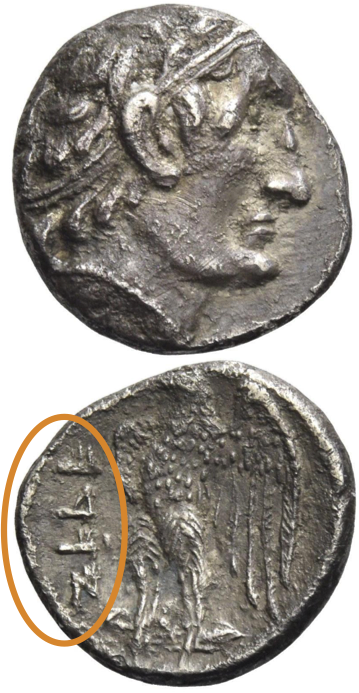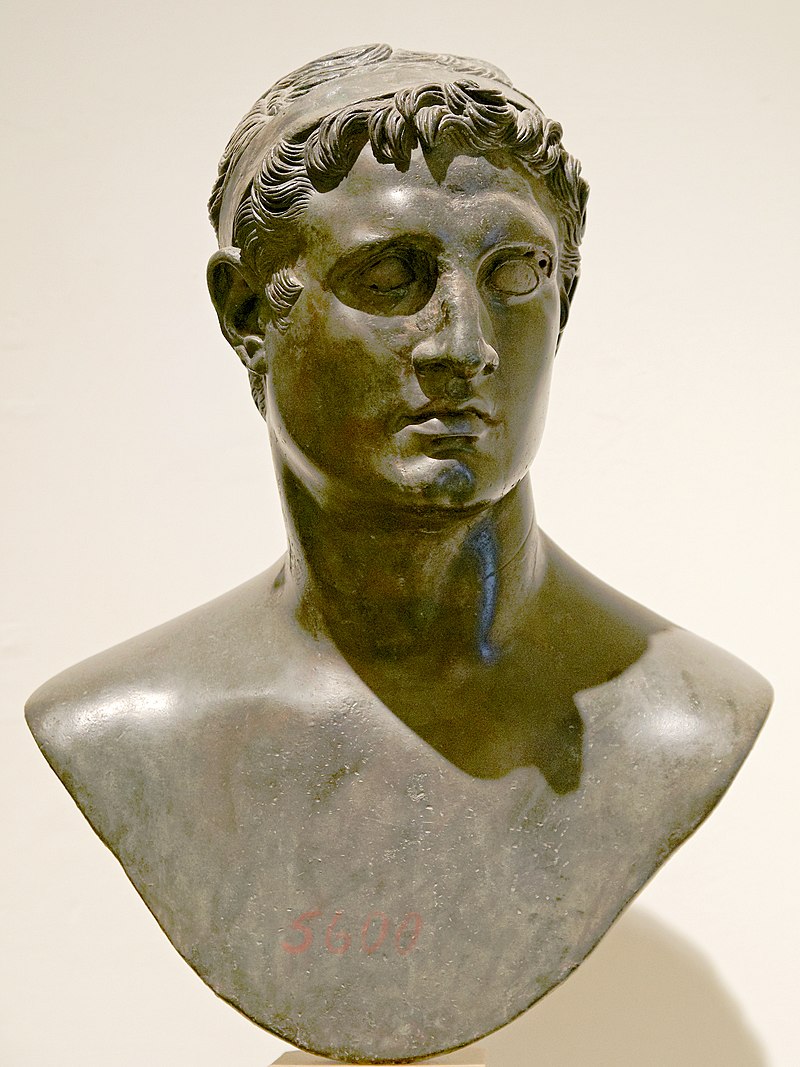300 - 200 BCE
The Hellenistic Period,
332-63 BCE
During the Ptolemaic era that lasted approximately from 300 - 200 BCE, Judea was ruled from Egypt. Jews enjoyed relative autonomy evident by the building of synagogues across Egypt during that time. Being the main vernacular, Jews spoke Greek which also expanded into their prayer liturgy. This, together with the Greeks’ curiosity in the Jewish adherence to the Torah and a monotheistic belief in one G-d vastly differing from their own polytheistic belief in a pantheon of gods championed by Zeus, led to the famous translation of the Five Books of Moses into Greek, called the Septuagint.
19th Century Etching of the Library of Alexandria by O. Von Corven

The Israel Museum, Haim Gitler
Ptolemaic Judea Coin,
c. 261-242 BCE
Minted in the reign of Ptolemy II, in honor of his father, this coin depicts the diademed head of Ptolemy I. On the reverse is an eagle with spread wings standing on a thunderbolt. In the field on the left is written "YHDH" (Yehudah, meaning Judea) in Paleo-Hebrew.
Ptolemy II (r. 284-246 BCE) was benevolent towards the Jews of Egypt and Judea, set free Jewish slaves, and allowed synagogues to be built in Egypt.
Josephus 12.2.3
“…if there be any [Jewish slaves] that have been lately brought thither, be made free by those that possess them.”
Pictured here is a Ptolemaic Judea Coin that was minted during the
reign of Ptolemy II, somewhere between 261-242 BCE in honor of his father, Ptolemy I, depicting his
diademed head. On the
reverse side is an eagle with spread wings standing on a thunderbolt. To
its left written in Paleo-Hebrew are the letters Yud Heh Dalet and Heh meaning
Yehudah or Judea.
Benevolent to the Jews in Judea and Egypt, Ptolemy II set the Jewish
slaves free whom his father captured and allowed synagogues to be built in
Egypt.
Josephus Book 12 Chapter 2 Paragraph 3 “…if
there be any [Jewish slaves] that have been lately brought thither [Egypt], be
made free by those that possess them.”
The Great Library of Alexandria
The Alexandria Library, built by the Greek-Egyptian king Ptolemy I around 300 BCE, was the greatest center of scholarship in the ancient world. The library was not only a repository of hundreds of thousands of papyrus scrolls (ancient books), but it was a research center where scholars compiled editions of Homer’s epics, scientists measured the size of the earth, and Euclid discovered the rules of geometry. In 48 BCE, a fire destroyed 400,000 of the library’s papyrus scrolls.
Proposed by Greek-Egyptian king Ptolemy I and eventually built by his son, Ptolemy II around 280 BCE, the Alexandria Library was the greatest center of scholarship in the ancient world; attracting scholars from around the Mediterranean, making Alexandria, founded by Alexander the Great, the preeminent intellectual center of its time. The library not only housed a repository of hundreds of thousands of papyrus scrolls but became a research center where scholars compiled editions of Homer’s epics, scientists measured the size of the earth, and Euclid discovered the rules of geometry. In 48 BCE, during the time of Julius Caesar and Cleopatra, a fire destroyed 400,000 of the library’s papyrus scrolls.
19th Century Etching of the Library of Alexandria by O. Von Corven
At the Direction of Ptolemy II, The Hebrew Bible Is Translated Into Greek, c. 260 BCE
Around 260 BCE, Ptolemy II ordered that the Hebrew Bible be translated into Greek for the Great Library of Alexandria for both the Jewish population of Egypt and those in vassal states abroad . This translation is known as the Septuagint.
The Letter of Aristeas
“Now since I (Ptolemy II) am anxious to show my gratitude to these men and to the Jews throughout the world: …
I have determined that your law shall be translated from the Hebrew tongue…into the Greek language, that these books may be added to…my library (The Great Library of Alexandria).”
As part of archiving literature from around the world for the
Great Library of Alexandria, Ptolemy II ordered that the Torah, or five books
of Moses, be translated into Greek around 260 BCE.
The liberation of the Jews that were sold into slavery by his
father, was part of Ptolemy’s strategy to secure the cooperation of Eleazer, the Jewish high
priest in Jerusalem, in sending him the best scholars for the task.
The Letter of Aristaeus: "I have determined that your law shall be translated from the
Hebrew tongue…into the Greek language, that these books may be added to…my
library.”
The Vatican Library

Ptolemy II Philadelphus
National Archaeological Museum, Naples
The name “Septuagint” derives from “The Translation of the Seventy”
Josephus, Antiquities 12.2
“He (Ptolemy II Philadelphus) procured the law to be interpreted... (Demetrius said) …O King, thou mayest write to the High Priest (Eleazar) of the Jews, to send six of the elders, out of every tribe; and those such as are most skillful of the laws: that by their means we may learn the clear and agreeing sense of these books (The Hebrew Bible.)”
The translation is known as the Septuagint, derived from the Latin word for “seventy”, referring to the koine Greek translation of the Torah.
Josephus, Antiquities 12.2
“He (Ptolemy II Philadelphus) procured the law to be interpreted... (Demetrius said) …O King, thou mayest write to the High Priest (Eleazar) of the Jews, to send six of the elders, out of every tribe; and those such as are most skillful of the laws: that by their means we may learn the clear and agreeing sense of these (five) books”
The "Seventy" refers to the 72 Jewish scholars who were placed in separate rooms, and asked to translate the Torah. All of them translated it in the exact same way with 13 famous instances in which they all veered from translating the text in a perfectly literal way due to a concern of misinterpretation. The 72 scholars finished the translation in 72 days. The Jews view this as a day of mourning, as the rich multi-layered Hebrew text filled with hidden nuances, had been simplified into a superficial tongue.
The Septuagint in the Papyrus Fouad 266, Written in 1st Century BCE
Discovered in Fayyum, Egypt in 1939, The Papyrus Fouad 266 is one of the oldest manuscripts of the Septuagint. 117 fragments have been found, including portions of Genesis and Deuteronomy. The writing uses the Hebrew Tetragrammaton, Y-H-V-H, for the name of the Lord (pictured in red) in the midst of Greek.
In this picture is the Papyrus Fouad 266, discovered in Fayyum, Egypt in 1939; It is one of the oldest manuscripts of the Septuagint. 117 fragments have been found, including portions of Genesis and Deuteronomy. The writing uses the Hebrew Tetragrammaton, (Yud and Hey and Vav and Hey), for the name of the L-rd, marked here in red, in the midst of Greek.
The Papyrus furthermore lines out synagogue rituals, the Triennial or 3-year cycle of the reading of the Torah, differing from the modern one-year cycle, and the benediction of the Kohanim or priests, as was commanded during the giving of the Torah at Mt Sinai.
Fragment of Deuteronomy 31:28 - 32:7 from the Papyrus Fouad
Société Royale de Papyrologie, Cairo
The Ten Commandments
The Septuagint in the Codex Vaticanus, Written in Israel, c. 325 CE
The Codex Vaticanus is one of the oldest versions (4th century CE) of the Greek Bible, containing an almost complete copy of the Septuagint (a Jewish translation of the Bible into Greek).
The manuscript has been housed in the Vatican Library (founded by Pope Nicholas V in 1448) for as long as it has been known, appearing in its earliest catalog of 1475 and in the 1481 catalogue.
Pictured here is the Codex Vaticanus which was written in Israel,
circa 325 BCE. It is one of the oldest versions (4th century CE) of the Bible
in Greek, containing an almost complete copy of the Greek translation of the
Hebrew Bible.
The manuscript has been housed in the Vatican Library, founded by
Pope Nicholas V in 1448, for as long as it has been known, appearing in its
earliest catalogue of 1475 and in the 1481 catalogue.
Click
on the button below to view the full digitization of the Codex Vaticanus photographed
by Ardon Bar Hama, courtesy of George Blumenthal.
codex vaticanus
The Vatican Library
Photography by Ardon Bar-Hama, Courtesy of George Blumenthal
Synagogues In Ptolemaic Egypt
The Jews of Egypt built several synagogues there. The construction of these synagogues has been documented by several "proseuche" dedication inscriptions discovered by archaeologists. From the Greek word meaning “prayer,” a proseuche is a synagogue or a place for Jews to pray.
Ancient Synagogue Inscription from Crocodilopolis, Egypt, 240 BCE
"On behalf of King Ptolemy (III Euergetes), son of Ptolemy and Queen Bernice his wife and sister and their children, the Jews in Crocodilopolis (dedicated) the proseuche (synagogue.)”
Inscription from Synagogue at Athribis (Tell Atrib), Egypt, 194 BCE
"On behalf of King Ptolemy and Queen Cleopatra, Ptolemaios son of Epikydes, chief of police, and the Jews in Athribis [dedicated] the proseuche (synagogue) to G-d the Most High."
Synagogues In Ptolemaic Egypt
The Jews of Egypt built several synagogues. The construction of these synagogues has been documented by several "proseuche" dedication inscriptions discovered by archaeologists in Crocodilopolis, Schedia, Athribis, Xenophrys, Nitriai and Alexandria. From the Greek word meaning “prayer,” a proseuche is a synagogue or a place for Jews to pray.
Another inscription from the ancient synagogue in Crocodilopolis, 240 BCE reads:
"On behalf of King Ptolemy (III Euergetes), son of Ptolemy and Queen Bernice his wife and sister and their children, the Jews in Crocodilopolis (dedicated) the proseuche.
The Inscription from Synagogue at Athribis, Egypt, 194 BCE reads:
"On behalf of King Ptolemy and Queen Cleopatra, Ptolemaios son of Epikydes, chief of police, and the Jews in Athribis [dedicated] the proseuche to G-d the Most High."
Additional inscriptions were found documenting synagogues across Egypt.
The word synagogue is derived from the Greek word sunagōgḗ which means assembly or gathering. After the restoration of the Second Temple in 515 BCE, Ezra and the Men of the Great Assembly standardized a compulsory communal service for individuals to participate in, especially for those in the diaspora including Babylon and Egypt. This developed into dedicated places of worship that were already well established in the time of Ptolemy II.
Proseuche inscriptions have been found in Crocodilopolis (240 BCE), Schedia (240 BCE), Athribis (194 BCE), Xenophrys (120 BCE), Nitriai (120 BCE) and Alexandria (120 and 40 BCE)
Hellenistic Burial Tomb from Maresha, Israel
3rd-2nd Century BCE
Joshua 15:21, 44
The towns at the far end of the tribe of Judah, near the border of Edom, in the Negev, were: ...Keilah, Achzib, and Maresha: 9 towns, with their villages.
In 1902, elaborately painted tombs were found 30 Miles southwest of Jerusalem. An inscription identifies the site as Maresha.
In 1902,
elaborately painted tombs, dating back to sometime between the third and second
centuries BCE, were found 30 Miles southwest of Jerusalem. An inscription identifies the site as
Maresha. Tel Maresha is the tel or archaeological mound of the biblical Iron
Age city of Maresha, later known by its Hellenised name Marisa.
Maresha is mentioned in the Book of Josua 15:21 and 44. “The towns at the far end of the tribe of Judah,
near the border of Edom, in the Negev, were: ...Keilah, Achzib, and Maresha: Nine
towns, with their villages.”
Wikimedia Commons, Photo by Yair Talmor
created with
WordPress Website Builder .